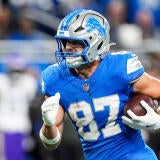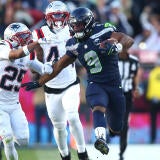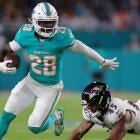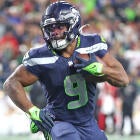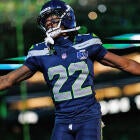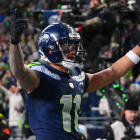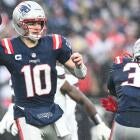2019 Fantasy Football Draft Prep: Wide Receiver Tiers 4.0 and strategies
Wide receivers made a big comeback in Fantasy last season. Dave Richard takes a look at the position for 2019.
Wideouts bounced back in a big way last year. As a whole, receivers scored a record-high 532 touchdowns to boost their Fantasy numbers. Their running back counterparts didn't average as many Fantasy points per game in PPR based on top-12 (0.3 higher), top-24 (1.9 higher) or top-36 averages (1.8 higher). Can't remember the last time that happened.
But maybe the best news of all for Fantasy drafters is that wide receivers aren't quite as top-heavy as they were last year.
In addition to knowing your lineup requirements and scoring system, you must answer these questions:
- How risk-averse are you?
- How badly do you want to fill your starting lineup with no-brainers?
- How deep do you think this position is?
- Are you good at finding replacement receivers off waivers?
The first two questions go hand-in-hand: Wide receivers are generally safer than their running back counterparts, but they typically don't score as much in non-PPR, and only the top guys come close to matching up in PPR. The more of those "safe" picks you want for your starting group, the more receivers you should target early in your draft.
You can use my tiers to determine how deep you think the position is, but after stewing on this for six months (that's right, while you were living your life, I was studying these guys), I feel real good about the wideouts in the first four or five rounds being good starters. I'm also confident that the receivers in the fifth and sixth tiers make up a bunch of breakout and sleeper candidates who carry enough upside to warrant starting. You should find the entire class to your liking and may even decide to wait to draft your third or fourth receivers.
That last question? I'm not you, so I can't exactly answer that. But if you've played Fantasy Football for a while, you know that there are receivers with at least decent upside on waivers every week. No one who will cement himself into a starting spot, but someone who offers a chance at scoring a touchdown, going for 70 yards, etc. The better you (and we) are at finding them, the less urgency you'll need to draft deep.
Just know that nearly every Fantasy manager will select at least one very good receiver before the end of Round 3. That doesn't mean it's a mistake to lock up two of them if you want to differentiate your lineup, but that is a move that's best saved for PPR formats and smaller leagues (10 or fewer teams).
But the safest plan on Draft Day is to pick enough receivers from the top-five or six tiers to cover your starting spots, then another two or three for the bench. And always remember that receivers who tend to play the best in Fantasy are those who regularly get a piece of the target share from good quarterbacks. When you're drafting a receiver who doesn't already carry stud status, ask yourself if he has the potential for 120 targets (to yield 70-plus receptions) and/or eight touchdowns. Those are the stats we're shooting for from the non-obvious guys in Round 6 and beyond. The more of those players you get, the more likely you'll compete for a trophy in December.
PPR Wide Receiver Tiers
- Mega-Elite (Round 1): DeAndre Hopkins, Julio Jones, Davante Adams, Odell Beckham, JuJu Smith-Schuster
- Elite (Round 2): Tyreek Hill, Michael Thomas, Mike Evans, Amari Cooper, Keenan Allen, T.Y. Hilton
- Excellent (Round 3): Antonio Brown, Stefon Diggs, Julian Edelman, Adam Thielen, Brandin Cooks
- Very good (Round 4): Kenny Golladay, Chris Godwin, Cooper Kupp, Robert Woods, Calvin Ridley
- High-value upside (Round 5): Robby Anderson, Tyler Lockett, Tyler Boyd, Christian Kirk, D.J. Moore, A.J. Green, Dede Westbrook, Dante Pettis, Mike Williams
- Mid-value upside (Rounds 6-7): Alshon Jeffery, Allen Robinson, Corey Davis, Curtis Samuel, Will Fuller, Sterling Shepard, Jarvis Landry
- High-potential backups (Rounds 8-9): DeSean Jackson, Courtland Sutton, Sammy Watkins, Larry Fitzgerald, Marvin Jones, Anthony Miller, Keke Coutee, Donte Moncrief
- Mid-potential backups (Round 10-11): Tyrell Williams, Geronimo Allison, Marquez Valdes-Scantling, John Brown, Golden Tate, DaeSean Hamilton, Parris Campbell, Emmanuel Sanders, Albert Wilson
- Bench depth (Round 12+): Kenny Stills, Devin Funchess, N'Keal Harry, Jamison Crowder, Miles Boykin, Josh Gordon, D.K. Metcalf, Marquise Brown, James Washington, Michael Gallup
What about punting on receivers and not taking any until after 50th overall? That's the kind of plan you're going to have to follow if you insist on drafting two stud running backs and a stud tight end with your first trio of picks. This is do-able in smaller non-PPR formats and it carries a chance at being successful, especially if you pull the lever on the right receivers starting in Round 5.
Non-PPR Wide Receiver Tiers
- Mega-Elite (Round 1): DeAndre Hopkins, Julio Jones, Davante Adams, Odell Beckham, Tyreek Hill
- Elite (Round 2): JuJu Smith-Schuster, Michael Thomas, Mike Evans, Amari Cooper, T.Y. Hilton
- Excellent (Round 3): Antonio Brown, Keenan Allen, Stefon Diggs, Brandin Cooks
- Very good (Round 4): Julian Edelman, Adam Thielen, Kenny Golladay, Cooper Kupp, Chris Godwin
- High-value upside (Round 5): Robert Woods, Calvin Ridley, Robby Anderson, Tyler Lockett, Tyler Boyd
- Mid-value upside (Rounds 6-7): A.J. Green, Christian Kirk, D.J. Moore, Dante Pettis, Mike Williams, Will Fuller, Alshon Jeffery, Allen Robinson, Dede Westbrook, Curtis Samuel
- High-potential backups (Rounds 8-9): Corey Davis, Sterling Shepard, Jarvis Landry, DeSean Jackson, Sammy Watkins, Marvin Jones, Anthony Miller, Courtland Sutton, Geronimo Allison
- Mid-potential backups (Round 10-11): Donte Moncrief, Keke Coutee, Tyrell Williams, John Brown, Marquez Valdes-Scantling, Parris Campbell, Kenny Stills, Larry Fitzgerald, Emmanuel Sanders
- Bench depth (Round 12+): Golden Tate, James Washington, Devin Funchess, Michael Gallup, N'Keal Harry, Miles Boykin, DaeSean Hamilton, D.K. Metcalf, Marquise Brown, Josh Gordon, Albert Wilson
But the safest plan on Draft Day is to pick enough receivers from the top-five or six tiers to cover your starting spots, then another two or three for the bench. And always remember that receivers who tend to play the best in Fantasy are those who regularly get a piece of the target share from good quarterbacks. When you're drafting a receiver who doesn't already carry stud status, ask yourself if he has the potential for 120 targets (to yield 70-plus receptions) and/or eight touchdowns. Those are the stats we're shooting for from the non-obvious guys in Round 6 and beyond. The more of those players you get, the more likely you'll compete for a trophy in December.







